C&S #1006 Restoration Photos
123















123
C&S #1006 Restoration Photos
|
The C&S Railway Society has posted some photos on the NGDF of the work done on the 1006 so far.
|
|
Saw them Robert.
I must say that even though the side bracing shows where the side windows should have been on the DSP&P build, I didn't see any notches in the side angle bracing to accept the original extra side windows being placed there. With photos it's difficult to tell. Rick |
|
Anyone seen the preserved red 1511 on yellow sheathing above the end doors? See https://www.facebook.com/permalink.php?story_fbid=428115434009037&id=351938888293359
Way cool 
|
|
This seems to verify the "Theory" that the DL&G cabooses were painted to UP standards.
Rick |
Re: C&S #1006 Restoration Photos
|
In reply to this post by Jeff Ramsey
Well, we know the renumbering Guide of 1899 is accurate. The real trick is determining what number the original DSP&P number was. The Folio sheet on 1006 (308) says it was built in 1882 by an unknown builder (most likely the UP). Three cars known to have been built in 1882 were 71 - 73 but could have included 74 and 75. In 1883 car 76 - 78 are known to have been built but this was later in the year so 74 and 75 could have been built in 1883. alternatively - there are no records known for either of those cars. The folio for 1007 indicates it was built in 1883. In the 1885 number series there was a car between 1511 (308/1511) and 1513 (309/1007). If we consider that all 3 cars 73, 74, and 75 existed in June of 1885 when they became 1511, 1512 and 1513 and that 1511 was built in 1882 while 1512 and 1513 were built in early 1883 then there is a probability that indeed 1511(308/1006) was DSP&P 73 and 1513 (309/1007) was DSP&P 75.
|
Re: C&S #1006 Restoration Photos
|
In reply to this post by Rick Steele
And that the cars built in 1882 to 1884 (71-82?) were all likely yellow cars. Previous cars (60 - 70) built by the Sante Fe (assuming the first two cars came from that road) or by the South Park were the red cars. Probably...
|
Re: C&S #1006 Restoration Photos
|
Would you think that the "red"caboose in the Hancock picture had yellow or gold lettering?
|
Re: C&S #1006 Restoration Photos
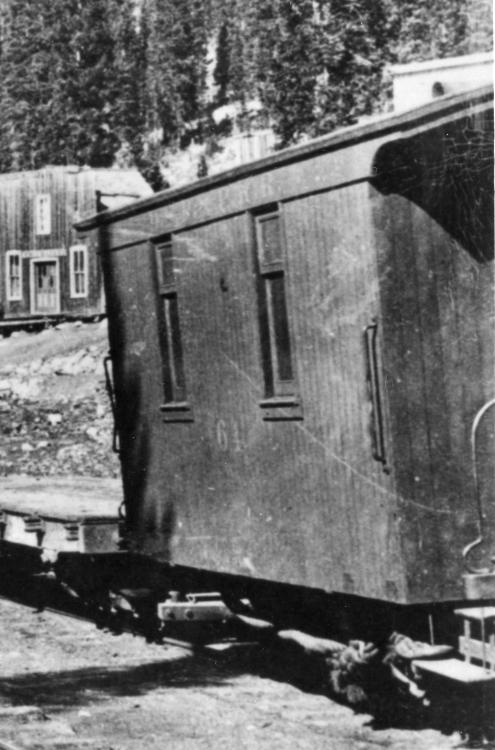 Waycar 64 It's very likely the lettering was something like yellow or gold. Gold doesn't seem to photo very strongly. There are a number of differences between this "early" car and later UP built cars. The lettering lacks the arched "waycar" over the number and the platform steps are different. Note that hand rails appear on the sides but not the end of the body. 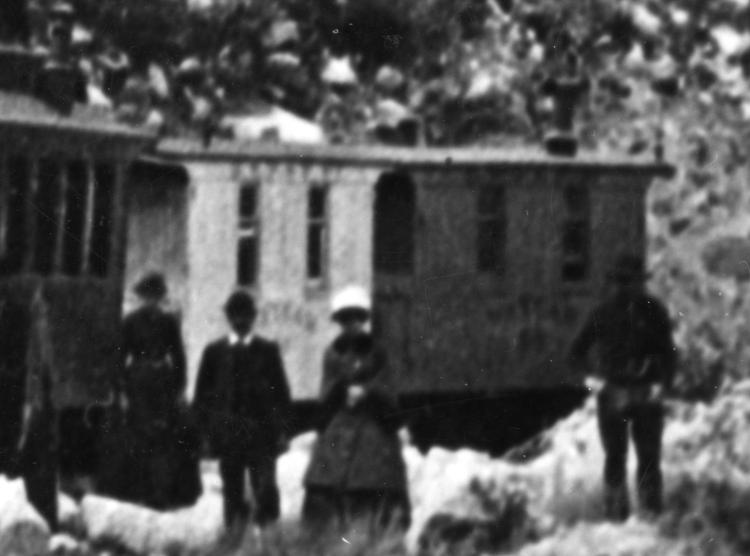 Post 1885 light and dark waycars After the UP renumbering these wo cars seem to be yellow and red. Clearly the lettering is not gold or yellow but perhaps a bright red or black. Both have the arched waycar and both have end hand rails. Dig that kaaa-rrrrazy stack on the dark car; seems just a bit over sized! You can see what looks like flag poles on some of the roof corners and both cars have lantern brackets on the upper corners of the body. 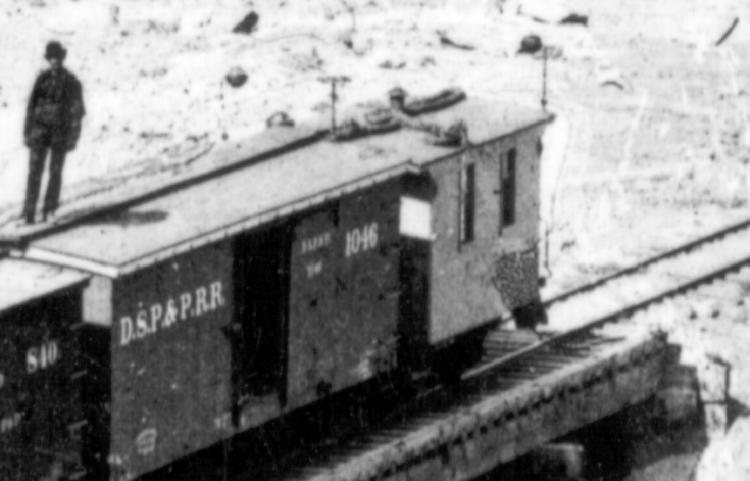 unknown car on the Highline post June 1885 Another post reno'g. light colored waycar. Whats interesting here besides the end hand railing and arched "waycar" (can't read the number) is what is on top. Near what looks like flag poles on opposite corners of the roof are what looks like roundish objects - like balls attached to the poles - perhaps being blown by a brisk breeze toward the left. Dead center - so it seems - in the roof is the smoke stake for the stove. Well maybe its an additional vent. I can't tell if that is a stack near the left corner next to the flag pole. Also note that there are brackets for lanterns on the upper corners. 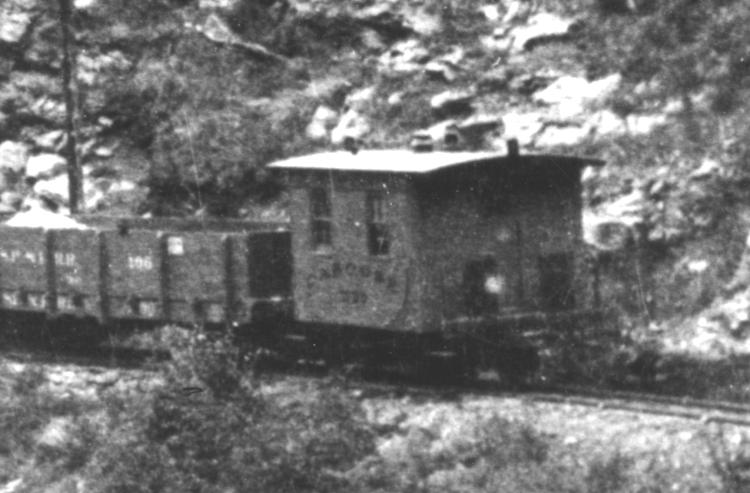 Near Beaver Brook - light colored CC car We wouldn't want to leave out the CC in all of this. This photo near Beaver Brook included what I think is CC 1725. There are a number of differences between the CC cars and the SP cars. Note, of course, the word Caboose instead of Waycar. There are vertical as well as horizontal mullions in the windows. Again there is some sort of device in the middle of the roof while beyond may be a stack. At each end of the roof appears what must be a flag / lantern holder. I think the yellow color indicates the CC cars were also built by the UP |
Re: C&S #1006 Restoration Photos
|
In reply to this post by Rick Steele
For those that do not have Facebook, here is one of the pictures posted/mentioned.
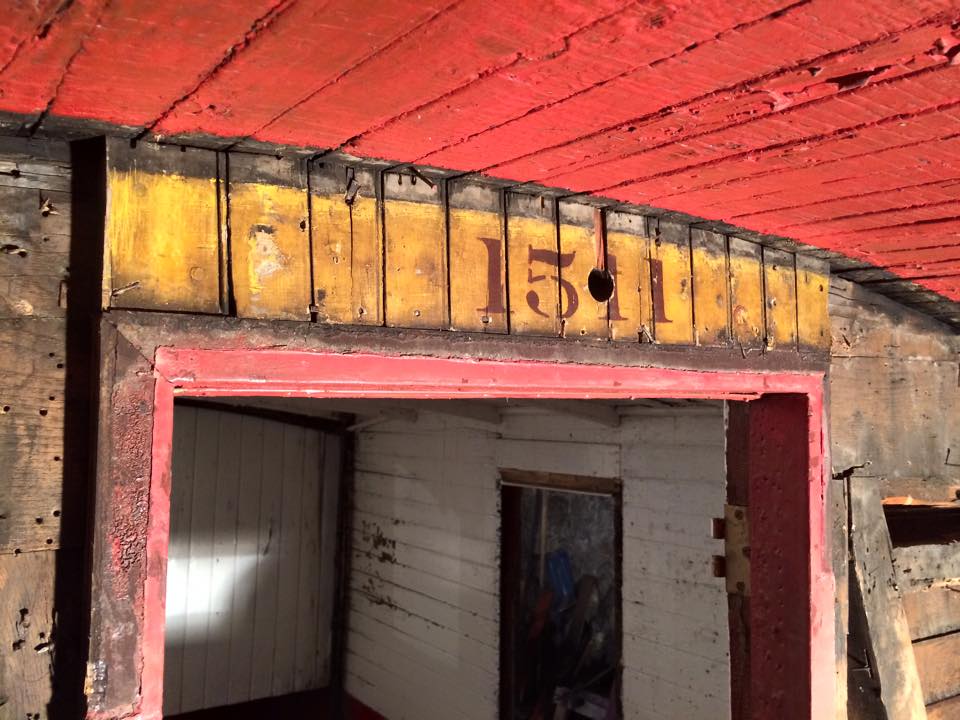
Doug Heitkamp
Centennial, CO |
Re: C&S #1006 Restoration Photos
|
This post was updated on .
Ok, so if the lighter colored Waycars (in B&W pictures) are yellow, and the lettering is the boxcar/oxide red color, then what color(s) are the drop shadows under the lettering? Any guesses? Rick, any UP info on the lettering and drop shadows?
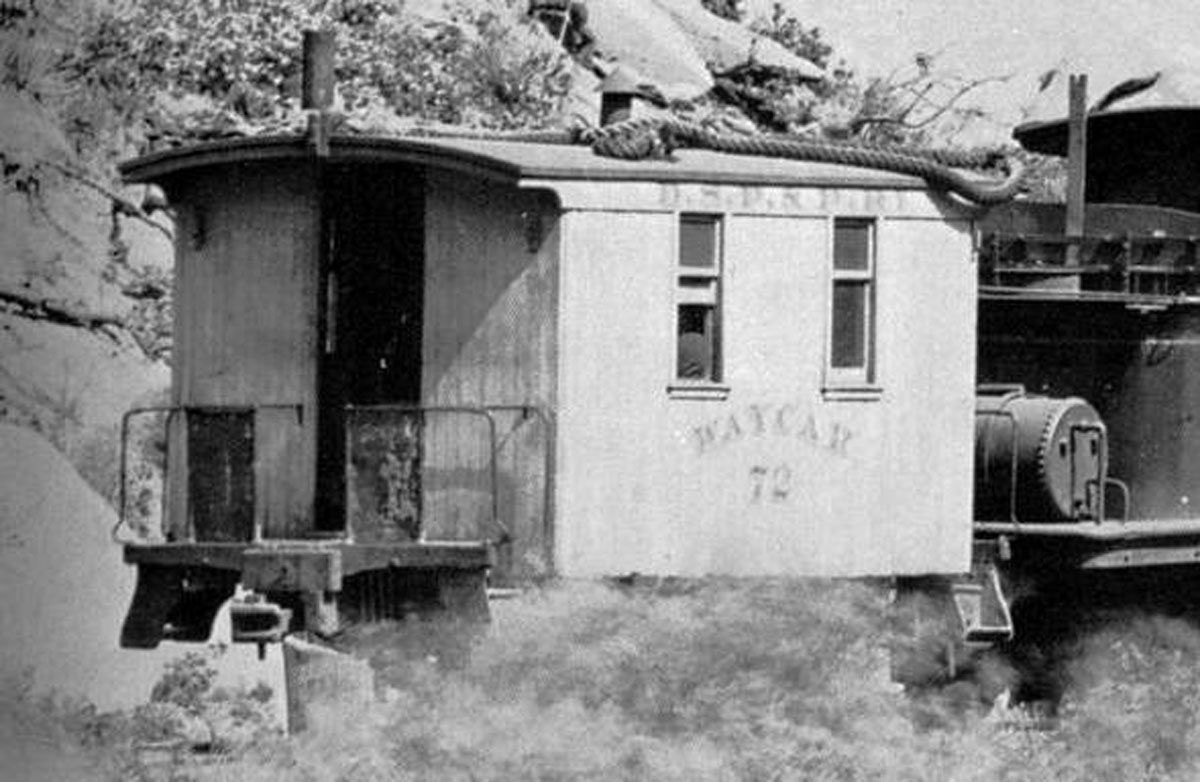 By the way, thanks to the pointer to the Facebook pictures. Amazing stuff just keep popping up and to think it was right there all the time! Doug
Doug Heitkamp
Centennial, CO |
Re: C&S #1006 Restoration Photos
|
In reply to this post by Rick Steele
|
Re: C&S #1006 Restoration Photos
|
In reply to this post by Doug Heitkamp
Another smoke stack in the middle of the roof. Check out how what looks like lantern brackets are on the visible end of the car and on at least the visible opposite corner. Also the centered roof marker over the platform. Since we are guessing about colors I vote for green - if the lettering is red. Green would make the red stand out more pronounced. But it could be gold or yellow or.... anything.
Wanna bet the door is red too? |
|
That couldn't be an air whistle on the roof, instead of a second stack?
|
Re: C&S #1006 Restoration Photos
|
In reply to this post by Derrell Poole
There's a color card for a DSP&P waycar done by the guys who are restoring the 1008 posted in the files section of the DSP-P Yahoo group.Also George Sebastian-Coleman posted pictures in the photos section of some tenders he'd lettered using 1883-84 style decal sets that have the shaded lettering(don't know the manufacturers name).
|
Re: C&S #1006 Restoration Photos
|
In reply to this post by Doug Heitkamp
Hi Doug, first thank you for posting the photo here. We appreciate news about the 1006 being shared. I wanted to just note, since its hard to tell from the photos, the numbers are actually closer to chocolate brown as opposed to oxide red. We are told this does conform to the UP standards of the time. As far as we've been able to discover the Way Car 73 was built by the UP Shops in Omaha in 1881. Since by this time the DSP&P was under the control of the UP its not too much of a leap to assume they may have conformed to the UP standards of the time. So its entirely possible that all the Waycars built by UP were painted to UP Standards from the beginning.
|
Re: C&S #1006 Restoration Photos
|
In reply to this post by Derrell Poole
Derrell,
to me the centred marker would be an early end-of-train marker, and thus should be Red, couldn't think of any reason it would be green (I will look silly {:)) if you're meaning somethingelse?), I guess some sort of wooden (or metal) paddle that was inserted at the trailing end.
UpSideDownC
in New Zealand |
|
In reply to this post by Doug Heitkamp
According to Jim Eherenberger and Don Strack's UP Caboose Book, the drop shadows were either a dark brown or black.
Judging by the blending with the overall color scheme, I would opt for a brown. Not a boxcar red, an actual dirt brown. This is on the Sherwin Williams color card reprinted in the book as an example. I'll try to locate it and scan it for the rest of us. The Waycars, according to the UP Boston Journals, were built at Armstrong Shops, not Omaha. Armstrong is the name for the former Kansas Pacific yard in Kansas City, Kansas and its name and station still exists. Rick |
Re: C&S #1006 Restoration Photos
|
Rick, thank you for the tip, we've had some conflicting information on the origins of the cabooses. So any new information is very welcome.
|
Re: C&S #1006 Restoration Photos
|
Gratuitous shot of #1006 in 1982 {:))
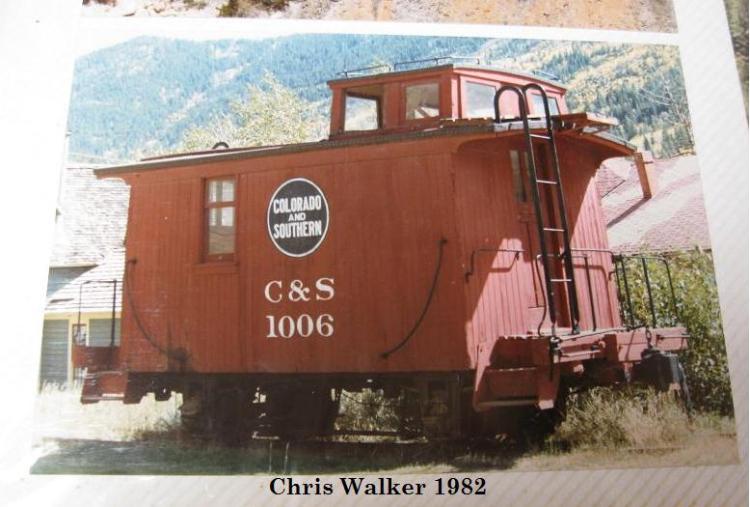
UpSideDownC
in New Zealand |
Re: C&S #1006 Restoration Photos
|
In reply to this post by nickgully
It certainly could be. Totally slipped my mind. Thanks.
|
«
Return to C&Sng Discussion Forum
|
1 view|%1 views
| Free forum by Nabble | Edit this page |

